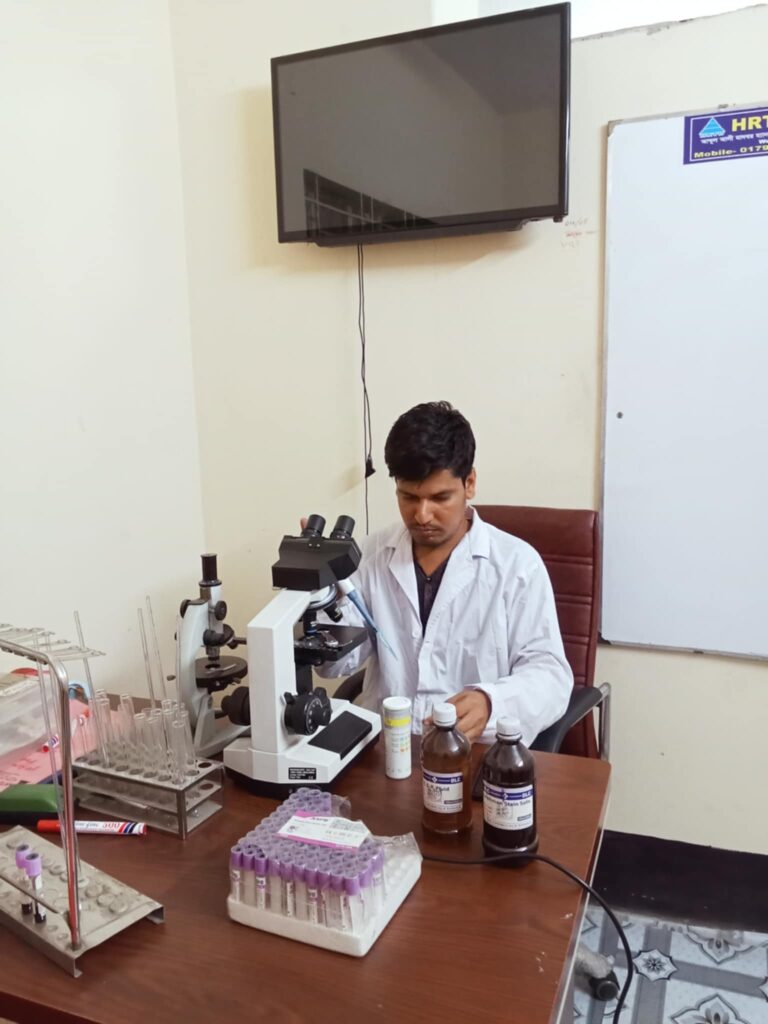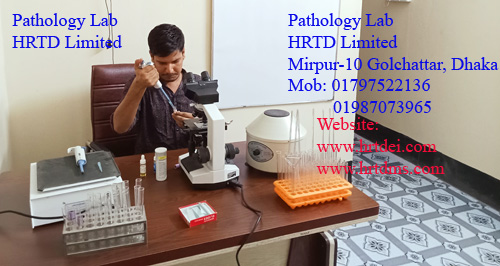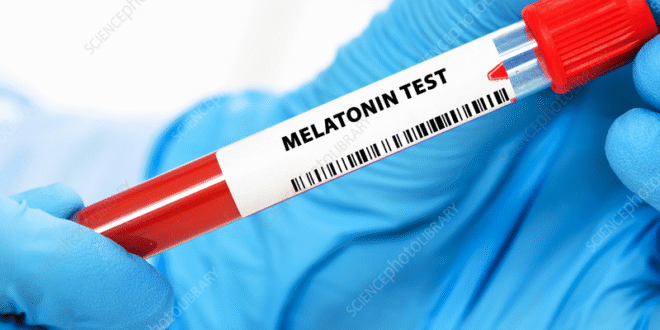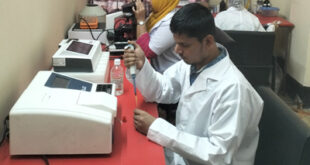
Introduction
The human body functions through a delicate balance of hormones that regulate sleep, metabolism, mood, and overall health. One of the most vital hormones for sleep regulation is melatonin, often referred to as the “sleep hormone.” Produced by the pineal gland in the brain, melatonin plays a crucial role in controlling the body’s circadian rhythm—the internal biological clock that dictates sleep-wake cycles.
A Melatonin Test is a diagnostic investigation used to measure the levels of melatonin in the body. Since melatonin secretion varies throughout the day, this test can provide valuable insights into sleep disorders, circadian rhythm disturbances, and other related health conditions.
At HRTD Medical Institute, Dhaka, we emphasize the importance of understanding and evaluating hormonal functions. Our diagnostic and training facilities are dedicated to providing medical students, healthcare professionals, and patients with comprehensive knowledge and advanced testing methods. This article explores melatonin, the test procedures, clinical significance, and the role of our institute in education and practical application.
Chapter 1: Understanding Melatonin
What is Melatonin?
Melatonin is a hormone synthesized from serotonin, which itself is derived from the amino acid tryptophan. Its production is stimulated by darkness and inhibited by light, meaning it helps the body align with the natural day-night cycle.
Key Functions of Melatonin
- Regulation of Sleep-Wake Cycle – Helps induce sleep and maintain healthy rest patterns.
- Antioxidant Role – Protects cells from free radical damage.
- Immune Modulation – Enhances immune responses.
- Reproductive Health – Influences puberty onset and seasonal breeding in animals.
- Mood and Mental Health – Helps regulate neurotransmitters linked to stress and depression.

Chapter 2: The Importance of Melatonin Testing
Why is Melatonin Testing Needed?
Testing melatonin levels helps in diagnosing:
- Sleep Disorders: Insomnia, delayed sleep phase syndrome, non-24-hour sleep disorder.
- Circadian Rhythm Disturbances: Common in shift workers or those with jet lag.
- Mental Health Conditions: Depression, anxiety, and seasonal affective disorder (SAD).
- Neurological Disorders: Alzheimer’s disease, Parkinson’s disease.
- Endocrine Disorders: Hormonal imbalances impacting sleep and metabolism.
Clinical Indications for Melatonin Testing
Doctors may recommend a melatonin test if a patient shows symptoms such as:
- Chronic difficulty falling asleep.
- Waking frequently at night.
- Extreme daytime fatigue.
- Depression or mood swings linked to seasonal changes.
- Irregular menstrual cycles due to hormonal disturbances.
Chapter 3: Types of Melatonin Tests
At HRTD Medical Institute, students and trainees are taught different testing methods.
1. Blood Test (Serum Melatonin)
- Measures melatonin levels in the bloodstream.
- Provides accurate, real-time hormone concentration.
- Requires multiple samples at different times (day vs. night).
2. Saliva Test
- Non-invasive and easy to collect.
- Reflects changes in melatonin secretion across the day.
- Common in sleep research and circadian rhythm studies.
3. Urine Test
- Measures 6-sulfatoxymelatonin, a major melatonin metabolite.
- Provides integrated data over longer periods.
- Useful in population studies and large-scale research.

Chapter 4: The Melatonin Test Procedure
Preparation Before the Test
- Avoid caffeine, alcohol, and certain medications (beta-blockers, NSAIDs, etc.) as they can interfere with results.
- Maintain a regular sleep-wake schedule before testing.
- Inform the healthcare provider about supplements (especially melatonin supplements).
Sample Collection Process
- Blood Test – A healthcare professional draws blood, usually in the evening and night.
- Saliva Test – Collected using swabs at multiple intervals (dim-light melatonin onset method).
- Urine Test – 24-hour urine collection to measure metabolites.
Duration and Result Time
- Collection may take several hours to a full day, depending on the method.
- Results are usually available within 2–5 working days.
Chapter 5: Interpreting the Results
Normal melatonin levels vary by age, time of day, and individual lifestyle.
- Daytime (light exposure): Low melatonin (below 10 pg/mL in blood).
- Nighttime (darkness): High melatonin (ranging 50–200 pg/mL in blood).
Low Melatonin Levels Indicate:
- Insomnia or sleep-onset difficulties.
- Anxiety or depression.
- Possible pineal gland dysfunction.
High Melatonin Levels Indicate:
- Pineal tumors (rare).
- Seasonal affective disorder.
- Overuse of melatonin supplements.
Chapter 6: Clinical Applications of the Melatonin Test
1. Sleep Medicine
- Identifies circadian rhythm misalignments.
- Helps design personalized sleep therapy.
2. Psychiatry
- Evaluates depression, bipolar disorder, and SAD.
- Guides light therapy or melatonin supplementation.
3. Neurology
- Used in research on Alzheimer’s and Parkinson’s.
- Provides insights into neurodegenerative disease progression.
4. Endocrinology and Reproductive Health
- Assesses hormonal imbalances affecting menstrual cycles and fertility.
- Monitors puberty onset in adolescents.
Chapter 7: Advantages and Limitations
Advantages
- Provides objective data about sleep disorders.
- Non-invasive options (saliva, urine) available.
- Supports research in chronobiology.
Limitations
- Requires multiple samples over time.
- Influenced by lifestyle and external factors (light exposure, food).
- May be costly in certain diagnostic centers.
Chapter 8: Melatonin Supplements vs. Testing
Many patients self-prescribe melatonin supplements for sleep issues. However, without proper testing, this may cause dependency or mask underlying conditions.
At HRTD Medical Institute, we educate students and the public about the importance of testing melatonin levels before starting supplementation. This ensures treatment is evidence-based and personalized.
Chapter 9: HRTD Medical Institute’s Role
1. Training Programs
We offer specialized training for medical and paramedical students in:
- Endocrinology and hormone testing.
- Laboratory techniques for melatonin and other biomarkers.
- Interpretation of hormone test results.
2. Diagnostic Services
Our institute provides affordable and accurate hormone testing, including melatonin, to help patients and physicians make informed decisions.
3. Research and Innovation
HRTD Medical Institute actively participates in research on sleep medicine, circadian biology, and hormonal health. Students are encouraged to engage in research projects involving melatonin testing and its clinical applications.
Chapter 10: FAQs on Melatonin Test
Q1: Can I take melatonin supplements before the test?
No. Supplements will interfere with results. Discontinue at least 48–72 hours before testing.
Q2: How is melatonin different from sleeping pills?
Melatonin regulates natural sleep-wake cycles, while sleeping pills artificially induce sleep.
Q3: Is the test safe?
Yes. Blood, saliva, and urine tests are safe and minimally invasive.
Q4: Who should get tested?
Anyone with persistent sleep issues, shift workers, patients with depression, or those with suspected circadian rhythm disorders.
Q5: Does age affect melatonin levels?
Yes. Children and young adults produce more melatonin, while production declines with age, contributing to sleep problems in older adults.
Chapter 11: Case Study (Example for Students)
A 45-year-old shift worker complains of insomnia, daytime fatigue, and depression. A salivary melatonin test at HRTD Medical Institute reveals delayed melatonin onset and low night-time secretion. After personalized therapy involving light exposure in the morning and controlled melatonin supplementation, the patient reports improved sleep and mood within weeks.
This case highlights how melatonin testing guides effective treatment strategies.
Conclusion
The Melatonin Test is an essential diagnostic tool for understanding sleep disorders, circadian rhythm imbalances, and related health conditions. By measuring melatonin levels accurately, healthcare providers can design evidence-based interventions, improving patients’ quality of life.
At HRTD Medical Institute, we not only provide accurate diagnostic services but also train future healthcare professionals to master the science of hormone testing. Our commitment to medical excellence ensures that both patients and students benefit from the latest advancements in sleep medicine and endocrinology.
Melatonin testing is more than just a laboratory procedure—it is a gateway to better sleep, improved mental health, and enhanced overall well-being.
 Pathology Training Institute in Bangladesh Best Pathology Training Institute in Bangladesh
Pathology Training Institute in Bangladesh Best Pathology Training Institute in Bangladesh


